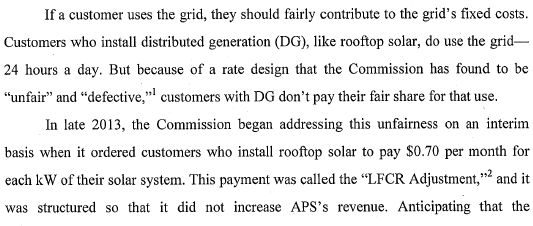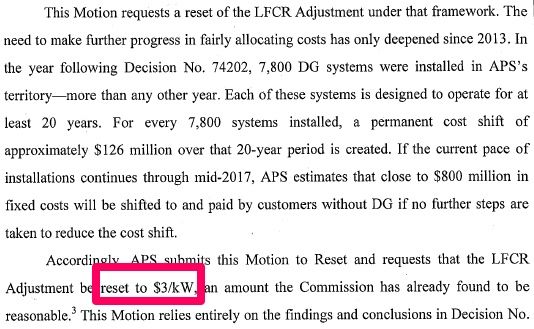Arizona utility APS just proposed that its regulator increase the grid access charge for solar "from 70 cents per kilowatt -- or approximately $5 per month -- to $3 per kilowatt, or roughly $21 per month for future residential solar customers. Existing rooftop solar customers would be grandfathered under the agreements they originally signed."
The regulatory body, the Arizona Corporation Commission (ACC), had suggested that the $21 per month fee was "an appropriate charge" back in 2013, but initially set the charge at $5 per month. The new utility proposal asks the rate to be reset to $21.
APS had originally asked for a fixed charge between $60 and $100 per month -- so $21 comes off as a sort of compromise.
According to a release, "Future rooftop solar customers would have the option to choose a demand-based rate and avoid the grid access charge."
It has been the view of APS and the state's regulators that grid-tied solar customers use grid services that must be paid for. Otherwise, they contend, there is a cost shift from solar owners to non-solar owners. Studies can be cited which support this viewpoint, as can studies which suggest that grid-tied solar provides a benefit and should not be penalized with a monthly fee. The true value of PV solar is not really settled -- and the battleground for determining this value is going to be in rate case negotiations across the U.S.
The APS proposal would not fully settle the cost shift issue and is intended as an interim solution until the problem is addressed in the next APS rate case, according to the utility.
“The growth of rooftop solar doesn’t lessen the need for the grid,” said APS CEO Don Brand in a release. “In fact, it’s just the opposite. The continued growth of rooftop solar depends on a modern grid that supports the two-way flow of electricity, accommodates the highly variable nature of solar power while maintaining reliability and backs up solar power with fast-starting, flexible conventional power sources.”
Few would confuse APS for Vote Solar, a PV advocacy group -- but despite APS' confrontational reaction to the rush of solar into its territory, APS Communications Manager Jim McDonald told GTM last night, "This is a process, and we want a serious policy-based dialogue," adding, "We don't want the rancor -- we want serious-minded conversations that lead to positive solutions."
Vote Solar's Adam Browning notes, "Vote Solar looks forward to working with APS on a data-driven, policy-based solution. The fact is, distributed generation adds a lot of value to the grid -- 14 cents per kilowatt-hour, according to an APS sponsored study in 2009, and another study found that distributed solar under current rates provide over $34 million in net benefits to the grid annually, starting in 2015."
McDonald continued, "What we're looking for is a way to modernize our pricing so we're more responsive to the needs of our customers who want solar -- we want to make solar sustainable for the long-term."
"What we want to do is provide tools for our customers to manage their energy usage. The demand charge might not be a perfect rate for all customers but can still provide a measure of control," he said.
Marc Romito, APS Manager for Renewable Energy, had this to say: “If you don’t use the grid, you shouldn’t have to pay for it, but if you do, you should pay your fair share. And today, virtually everyone uses the grid."
Browning suggests, "Fixed charges undermine the value proposition of distributed solar. Customers want energy choice. When utilities impose fees on solar customers, they effectively take away that choice from their customers."
Joy Seitz, CEO of Arizona solar installer American Solar & Roofing and a speaker at Greentech Media's upcoming Solar Summit, has noticed a softening in the utility's stance. Seitz told GTM that APS has been "pretty aggressive with us over the last couple of years." But she has seen a difference in the utility's actions in the last eight months, and "it's been a breath of fresh air." She said that there seems to have been "a change of heart" or at least in the commitment "to sit at the table" and work through the differences.
Seitz said she is excited that "a utility in our state is saying, 'We see a place for solar.'"
Some text from the APS proposal follows.


In a much less controversial move, APS just agreed to provide $1 million in upfront rebate incentive funding for a solar-plus-storage system pilot program. According to Joy Seitz, there are two programs -- 75 homes will be test beds for solar-plus-storage, as well as being "all-in" sites for new technologies. The other 100 homes will get solar-plus-storage at one rate along with a demand charge. The results of the pilot will help APS assess future investment in residential energy storage. The plan to roll out the 100 systems will be developed over the next 90 days.
Here's what we know about the project so far:
- APS might be the owner of the hardware
- SMA is being considered as inverter supplier for most of the 175 projects
- Systems will be built by the three installers that are part of the in-state installer coalition, ASDA (which includes American Solar)
Recently GTM's Julia Pyper reported that the Arizona Corporation Commission "voted 'no objection' to Arizona Public Service’s $28.5 million proposal to own 10 megawatts of residential solar systems. Customers that rent their roofs to the utility will receive a $30 credit on their bill each month for up to 20 years. The commission endorsed a separate proposal from Tucson Electric Power for 3.5 megawatts of rooftop solar. Private installers and their allies argued it was unfair to let government-backed monopolies compete against the entrepreneurs that forged the residential solar market, particularly now that the cost of solar panels and project installation have come way down."
Arizona installed 94 megawatts of solar in 2014 and has a total of 317 megawatts of solar in the state.
According to GTM Research senior solar analyst Cory Honeyman, Arizona is emerging is a growing opportunity for the residential solar-plus-storage market. On top of the new pilot program, 2 megawatts out of APS' 10-megawatt utility-owned residential solar program can also be dedicated to solar-plus-storage projects. Outside APS, the recent approval of a new peak demand charge for residential PV customers in SRP territory represents a new opportunity for solar plus storage solutions as well.



